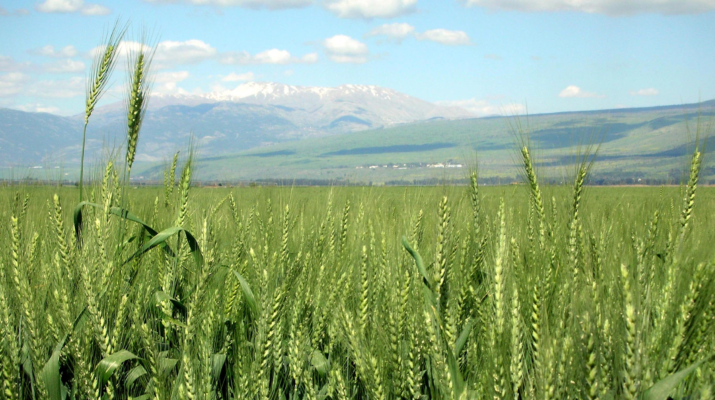James 5:7-10
Advent A3
7 Be patientA, therefore, beloved,B until the comingC of the Lord.D,E The farmerF waitsG for the preciousH cropI from the earth,J being patient with it until it receives the earlyK and the lateL rains.
A “be patient” = makrothumeo. 10x in NT. From makros (long, far distant, long lasting) [from mekos (length); probably related to megas (big, great, large – literal and figurative] + thumos (passion, passionate outburst; actions driven by passion, impulse, or emotion; this is passion express and often refers to rage or venting personal anger) [from thuo (to rage, seethe, rush along, breath violently, get heated up]. This is to persevere, be patient, be longsuffering, forbearing. Properly, this is one who defers anger and will not retaliate through anger. This is the opposite of a quick-tempered person; it is a long-spirited one.
B “beloved” = adelphos. From a (with as community and fellowship) + delphus (womb). This is brother – literally one with whom you have shared a womb. It is also used in a figurative sense as when one belongs to the same church.
C “coming” = parousia. From pareimi (to be present, to have come); from para (from beside, in the presence of) + eimi (to be). This is presence, arrival, coming, advent. Properly, this refers to the arrival of one who has authority or power to impact the local situation. So, it would be the visit of a king, dignitary or official. In the New Testament, this term is used particularly for the second coming of Christ. Parousia is used in English as a technical theological term.
D “Lord” = kurios. From kuros (authority, supremacy). This is a respectful address meaning master or sir. It refers to one who has control or power greater than one’s own. So, it was also applied to God and Jesus as Master or Lord.
E <untranslated> = idou. From eido (to be aware, behold, consider, see, know, remember). This is see! Lo! Behold! Look!. Used to call attention and/or express surprise or suddenness.
F “farmer” = georgos. 19x in NT. From ge (earth, land, soil, region, country; the physical earth and its inhabitants, the soil or region) + ergon (work, task, employment, deed, action, labor; toil in reference to the effort or to the occupation itself) [from ergo (to work, accomplish, do)]. This is literally a land worker and so a farmer. This is where the name George comes from.
G “waits” = ekdechomai. 7x in NT. From ek (from, from out of) + dechomai (to receive, take, accept, welcome; properly, to receive with hospitality; to receive literally or figuratively). This is to take or receive, but it implies to await or expect. It is a welcome from the heart that keeps focus on the outcome of the waiting.
H “precious” = timios. 13x in NT. From time (valuing, price, honor, mark of respect; the perceived value or worth to an individual; the notion of dignity); from tio (accord, honor, pay respect, value). This is valued, precious, honored, respected, costly. It refers to subjective value.
I “crop” = karpos. Fruit or vegetable – sometimes an animal. Also figurative for fruit as in result, deed, or action.
J “earth” = ge. Related to “farmer” in v7 (see note F).
K “early” = proimos. 1x in NT. From proi (early, dawn; by implication day break or the watch); from pro (before, in front of, above, ahead). This is early rain, early crops, or dawning. This would refer to the rain of autumn, the first of the rainy season.
L “late” = opsimos. 1x in NT. From opse (long after, late, in the evening); probably from opis (back, regard). This is late or latter. Used of the late rain, which would be in Spring.
8 You also must be patient. StrengthenM your hearts,N for the coming of the Lord is near.O
M “strengthen” = sterizo. 13x in NT. From sterigx (a support); probably from histemi (make to stand, to stand, place, set up, establish, appoint, balance, weigh, stand by, stand still, stand ready, stand firm, be steadfast). This is to set fast or fix. In a metaphorical sense, to buttress, prop up, support, strengthen, establish; to plant solidly.
N “hearts” = kardia. Literally the heart, but figuratively mind, character, inner self, will, intention, thoughts, feelings. Also, the center of something. The word heart is only used figuratively in the Old and New Testaments. This is where “cardiac” comes from.
O “near” = eggizo. From eggus (nearby or near in time). This is to make near, come near, bring near, approach, be at hand. This is used for something that is very close, imminent, a presence.
9 Beloved,P do not grumbleQ against one another, so that you may not be judged.R See,S the JudgeT is standing at the doors!
P “beloved” = adelphos. Same as “beloved” in v7. Literally “brothers.”
Q “grumble” = stenazo. 6x in NT. From steno (to moan, sigh, groan) OR from stenos (narrow, strait, constricted, compressed, small – something that is narrow because of nearby obstacles); likely from histemi (see note M above). This is to groan inwardly, a deep sigh, grief, to complain. This can be a groan that expresses grief, anger, or desire. It can be from being under pressure that is pushing one onward. This can be pleasant or anguishing. This word is for a feeling within oneself that is not expressed or shared with others. This is where “stenosis” comes from.
R “judged” = krino. To judge, decide, think good, condemn, determine, pass judgment, stand trial, sue. This is judging whether it is done in court or in a private setting. Properly, it refers to mentally separating or distinguishing an issue – to come to a choice or decision, to just positively or negatively in seeking what is right or wrong, who is innocent or guilty. It can imply trying, condemning, punishing, or avenging.
S “see” = idou. Same as the untranslated word in v7 (see note E above).
T “Judge” = krites. 19x in NT – 8x of human judges, 6x of God or Christ as judge, 4x of human judging unrelated to the judicial realm, and 1x of the historical Judges of Israel. Related to “judged” in v9. From krino (see note R above). This is judge, magistrate, or ruler.
10 As an exampleU of sufferingV and patience,W beloved, take the prophetsX who spoke in the nameY of the Lord.
U “example” = hupodeigma. 6x in NT. From hupo (by, under, about) + deiknumi (to show, point out, exhibit, teach, demonstrate, make known). This is a figure, copy, example, or model – an exhibit to be imitated or as a warning.
V “suffering” = kakopatheia. 1x in NT. From kakos (bad, evil; inwardly rotten; inner malice – an evildoer, evil thing, harm, wrong; something that is intrinsically evil) + pathos (passion, suffering, emotion, lust; what happens to someone) [from pascho (to suffer, be acted on positively or negatively; feeling a strong emotion, generally of suffering)] This word is affliction, suffering, experiencing evil, distress, hardship.
W “patience” = makrothumia. 14x in NT. Related to “be patient” in v7. (see note A). This is patience, long-suffering, forbearance, perseverance, fortitude. This is when one delays expressing anger so as not to act inappropriately from a place of anger.
X “prophets” = prophetes. From pro (before, in front of, earlier than) + phemi (to declare, say, use contrasts in speaking to shed light on one point of view). Phemi is from phao (to shine) or phaino (to bring light, cause to appear, shine, become visible or clear). This is a prophet or poet. One who speaks with inspiration from God
Y “name” = onoma. May be from ginosko (know, recognize, learn from firsthand experience). This is a name, authority, cause, character, fame, reputation. The name was thought to include something of the essence of the person so it was not thought to be separate from the person.
Image credit: Wheat in the Hula valley, Carol Spears, Israel, 2007



